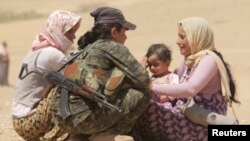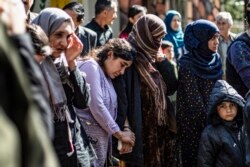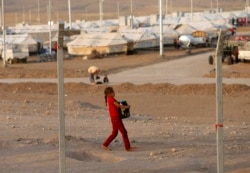Yazidi women and girls who were enslaved and raped by Islamic State militants have few choices. They may have been freed, but they can't bring home the children they had with the extremists.
Five years ago Saturday, IS militants launched attacks on Yazidi villages in northern Iraq, kidnapping, enslaving and massacring thousands. The attacks were labelled genocide by the United Nations.
The attacks traumatized the Yazidis, an ancient religious minority who are no strangers to persecution throughout the ages. But the brutality of the IS onslaught posed major challenges to the community. Although the Yazidis are a monotheistic faith, IS viewed them as heretics and sought to annihilate both the people and their religious sites.
In April, a month after the final military defeat of IS, Yazidi religious leaders made an apparent bid to protect the insular and still-grieving community by decreeing that they will embrace survivors of militant attacks. It was a move aimed at erasing the social stigma associated with rape.
But in what appeared to be a response to backlash from conservative community members, the spiritual council put out a statement days later saying its decision had been distorted. The council affirmed that children born to IS fathers would not be accepted back into the community.
Some mothers put their kids for adoption. A few refused to return home.
One woman, a 20-year-old resident of a village south of the town of Sinjar, recounted how she sobbed and yelled as her baby boy was peeled from her arms by the Kurdish-led Syrian Democratic Forces, who administer eastern Syria and lead the military fight against the militants there. The child was seven months old when her family paid ransom to free her from IS in October last year.
"I cried and screamed with all my might, but it didn't help anything," said the woman, who hailed from Tal Qasab village and who agreed to speak on the condition her name be withheld because of social stigma. She lives in a tent in a displaced persons' camp in Dohuk, miles from her village, which still lies in ruins.
"They said, `You can't take him with you. He is a Daesh child.' My family also didn't accept that I bring him back with me," she said, using the Arabic acronym for IS.
The militants attacked the Yazidi areas in Nineveh province on Aug. 3, 2014. They killed hundreds of Yazidi men, sometimes identifying them as adults only by the hair under their armpits. IS kidnapped the women, girls and boys, transporting most of them into Syria.
But hundreds are still missing. Some of the children who were raised under IS and indoctrinated in jihadi ideology have refused to go home and some still live in camps in Syria.
According to the Kurdistan region's Office for Yazidi Abductees, based in Dohuk, an estimated 3,425 Yazidis have been freed from a total of 6,417 abducted. The office said 1,921 children were saved out of 2,992 children.
When IS was finally defeated in March, a number of Yazidi women and children emerged from the last militant-held sliver of land, a riverside village in southeast Syria called Baghouz.
In Nesiriya village in Iraq's northern Mosul province, an 18-year old native of Sinjar who was liberated five months ago from Syria said she wants to join her mother and sisters who took refuge in Germany. Three of her brothers are still missing.
Freed from the last IS-held enclave on March 1, she didn't look back when she left behind her three children in Syria who were born to a Tunisian IS fighter.
They are all in an orphanage run by the Kurdish-led Syrian forces, she said.
She was only 13 when she was kidnapped. Tunisian militants bought and sold her, then forced her to convert to Islam and marry one of them.
"I told him that I don't want children, just give me pills or anything like that," she told The Associated Press. "He said no, I will make babies."
The young girl moved around with the IS militant and had three children in three different towns. The last, a four-month-old toddler, was born as IS was making its last stand.
Before leaving, she breastfed her baby and calmed the middle girl who was following her around in tears. For her eldest, a 2-year old boy, she bought new clothes and shoes.
"He ran to pick up his boots and told me: 'Mommy; take me with you in the car. Mommy, take me to the car.' I told him: 'Ok. OK. I will in a little bit,"' she recalled.
"I left him crying for me too. But they will forget me. They are still very young. They will forget me."






